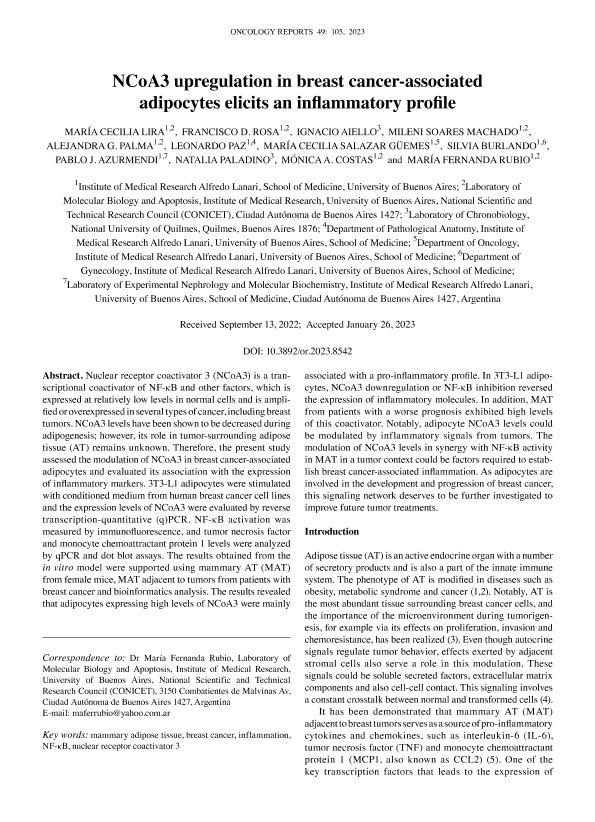Artículo
NCoA3 upregulation in breast cancer-associated adipocytes elicits an inflammatory profile
Lira, María Cecilia ; Rosa, Francisco Damián
; Rosa, Francisco Damián ; Aiello, Ignacio
; Aiello, Ignacio ; Soares Machado, Mileni
; Soares Machado, Mileni ; Palma, Alejandra Graciela
; Palma, Alejandra Graciela ; Paz, Leonardo Mariano; Salazar Güemes, María Cecilia; Burlando, Silvia; Azurmendi, Pablo Javier
; Paz, Leonardo Mariano; Salazar Güemes, María Cecilia; Burlando, Silvia; Azurmendi, Pablo Javier ; Paladino, Natalia
; Paladino, Natalia ; Costas, Monica Alejandra
; Costas, Monica Alejandra ; Rubio, Maria Fernanda
; Rubio, Maria Fernanda
 ; Rosa, Francisco Damián
; Rosa, Francisco Damián ; Aiello, Ignacio
; Aiello, Ignacio ; Soares Machado, Mileni
; Soares Machado, Mileni ; Palma, Alejandra Graciela
; Palma, Alejandra Graciela ; Paz, Leonardo Mariano; Salazar Güemes, María Cecilia; Burlando, Silvia; Azurmendi, Pablo Javier
; Paz, Leonardo Mariano; Salazar Güemes, María Cecilia; Burlando, Silvia; Azurmendi, Pablo Javier ; Paladino, Natalia
; Paladino, Natalia ; Costas, Monica Alejandra
; Costas, Monica Alejandra ; Rubio, Maria Fernanda
; Rubio, Maria Fernanda
Fecha de publicación:
05/2023
Editorial:
Spandidos Publications
Revista:
Oncology Reports
ISSN:
1021-335X
Idioma:
Inglés
Tipo de recurso:
Artículo publicado
Clasificación temática:
Resumen
Nuclear receptor coactivator 3 (NCoA3) is a transcriptional coactivator of NF-κB and other factors, which is expressed at relatively low levels in normal cells and is amplified or overexpressed in several types of cancer, including breast tumors. NCoA3 levels have been shown to be decreased during adipogenesis; however, its role in tumor-surrounding adipose tissue (AT) remains unknown. Therefore, the present study assessed the modulation of NCoA3 in breast cancer-associated adipocytes and evaluated its association with the expression of inflammatory markers. 3T3-L1 adipocytes were stimulated with conditioned medium from human breast cancer cell lines and the expression levels of NCoA3 were evaluated by reverse transcription-quantitative (q)PCR. NF-κB activation was measured by immunofluorescence, and tumor necrosis factor and monocyte chemoattractant protein 1 levels were analyzed by qPCR and dot blot assays. The results obtained from the in vitro model were supported using mammary AT (MAT) from female mice, MAT adjacent to tumors from patients with breast cancer and bioinformatics analysis. The results revealed that adipocytes expressing high levels of NCoA3 were mainly associated with a pro-inflammatory profile. In 3T3-L1 adipocytes, NCoA3 downregulation or NF-κB inhibition reversed the expression of inflammatory molecules. In addition, MAT from patients with a worse prognosis exhibited high levels of this coactivator. Notably, adipocyte NCoA3 levels could be modulated by inflammatory signals from tumors. The modulation of NCoA3 levels in synergy with NF-κB activity in MAT in a tumor context could be factors required to establish breast cancer-associated inflammation. As adipocytes are involved in the development and progression of breast cancer, this signaling network deserves to be further investigated to improve future tumor treatments.
Archivos asociados
Licencia
Identificadores
Colecciones
Articulos(IDIM)
Articulos de INST.DE INVEST.MEDICAS
Articulos de INST.DE INVEST.MEDICAS
Citación
Lira, María Cecilia; Rosa, Francisco Damián; Aiello, Ignacio; Soares Machado, Mileni; Palma, Alejandra Graciela; et al.; NCoA3 upregulation in breast cancer-associated adipocytes elicits an inflammatory profile; Spandidos Publications; Oncology Reports; 49; 5; 5-2023; 1-15
Compartir
Altmétricas



